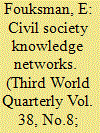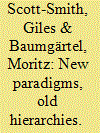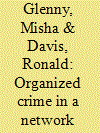|
|
|
Sort Order |
|
|
|
Items / Page
|
|
|
|
|
|
|
| Srl | Item |
| 1 |
ID:
153144


|
|
|
|
|
| Summary/Abstract |
What role have the processes and institutions of international development played in creating and propagating ideas around the world? This paper demonstrates that networks of development-focused civil society institutions can form global epistemic bridges even where communication technology, global markets, infrastructure, or state services do not reach. Given the penetration of these ‘civil society knowledge networks’ throughout the world, it is crucial to understand how these networks form, and how they create and spread ideas, mediating between global discourses and local needs. This paper builds on a multi-sited case study of one such civil society knowledge network, which includes an international foundation, its partner non-governmental organisations (NGOs) in Kenya, and one village where these NGOs run a forest conservation project. The case study provides a closely textured analysis of the mechanisms of knowledge production and consumption in the network, including personality politics, language, technology, political connections and the power dynamics of knowledge flows. It demonstrates the ways remoteness and disconnection are overcome through the epistemic reach of institutional networks involved in development interventions.
|
|
|
|
|
|
|
|
|
|
|
|
|
|
|
|
| 2 |
ID:
096483


|
|
|
|
|
| Publication |
2010.
|
| Summary/Abstract |
While much has been written about identity formation and the politics of ethnicity among minority communities in various parts of modern-day Southeast Asia, the same cannot be said regarding the Malay community of Singapore. This article seeks to address this scholarly neglect by bringing into sharp focus the dynamics, processes, and circumstances that shaped Malay identity in postcolonial Singapore during the 1980s. By interweaving historical data with theoretical insights derived from the works of Andrew Willford, Manuel Castells, and Richard Jenkins, among others, this article provides an analytical reading of the global, regional, and local developments that brought about an ethnic resurgence within one of the largest minority groups in this island city-state. Such developments prompted the Singapore government to devise new laws and employ multi-faceted strategies to regain its legitimacy in the eyes of a certain segment of the population, and to enhance its ruling capacity. The problematics embedded within the state's interpretation of Malay identity and the effects of citizen resistance against state policies are considered in detail in the final sections of this article.
|
|
|
|
|
|
|
|
|
|
|
|
|
|
|
|
| 3 |
ID:
105360


|
|
|
|
|
| Publication |
2011.
|
| Summary/Abstract |
As Obama took office at the beginning of 2009, several new figures attained important advisory positions in his administration. Anne-Marie Slaughter, former Dean of the Woodrow Wilson School at Princeton University, and now Director of Policy Planning in the State Department, is a prime example of the 'change' that has come to Washington. In recent years she has been part of a growing academic circle that views networks at the centre of international relations. At the same time, she has promoted the idea that the United States can be 'the most connected country' in such a world. By taking a closer look into the discourse of US supremacy and the current state-of-the-art in the theory of transnational networks, this article reveals the divergence between wishful thinking and reality in Slaughter's position. By analysing her position and introducing three case studies, we conclude that the complexity of power relations in a world of networks makes any assumption of US supremacy highly problematic. Some might 'mirror' the beliefs and values of America (Open Society Institute); some might only be a 'prism' of various different voices (Al-Jazeera); and some might fall totally outside state control to form 'shadow networks' (Khan Network). Ultimately, it is the belief in US exceptionalism that perpetuates the claim that the United States has 'an edge' in such a world, with potentially problematic consequences.
|
|
|
|
|
|
|
|
|
|
|
|
|
|
|
|
| 4 |
ID:
117963


|
|
|
|
|
| Publication |
2012.
|
| Summary/Abstract |
The very benefits of the Internet make it susceptible to being used against individuals, organizations, and states. The changing role of organized crime in a networked society demands understanding the risks involved when using new technologies. Misha Glenny, author of McMafia: Journey through the Global Criminal Underworld, explores the transitions and rapid expansion of what he calls the "global shadow economy," which today accounts for approximately 15 to 20 percent of the world's GDP.[i] According to Glenny, the great danger of cybercrime is the high risk of potentially affecting a large part of the world that is linked to the web and that finds significant value in its interconnectedness. In this interview, conducted by Ronald Davis of the Journal, Misha Glenny exposes the inherent problems associated with the nature of the Internet with respect to organized crime.
|
|
|
|
|
|
|
|
|
|
|
|
|
|
|
|
|
|
|
|
|